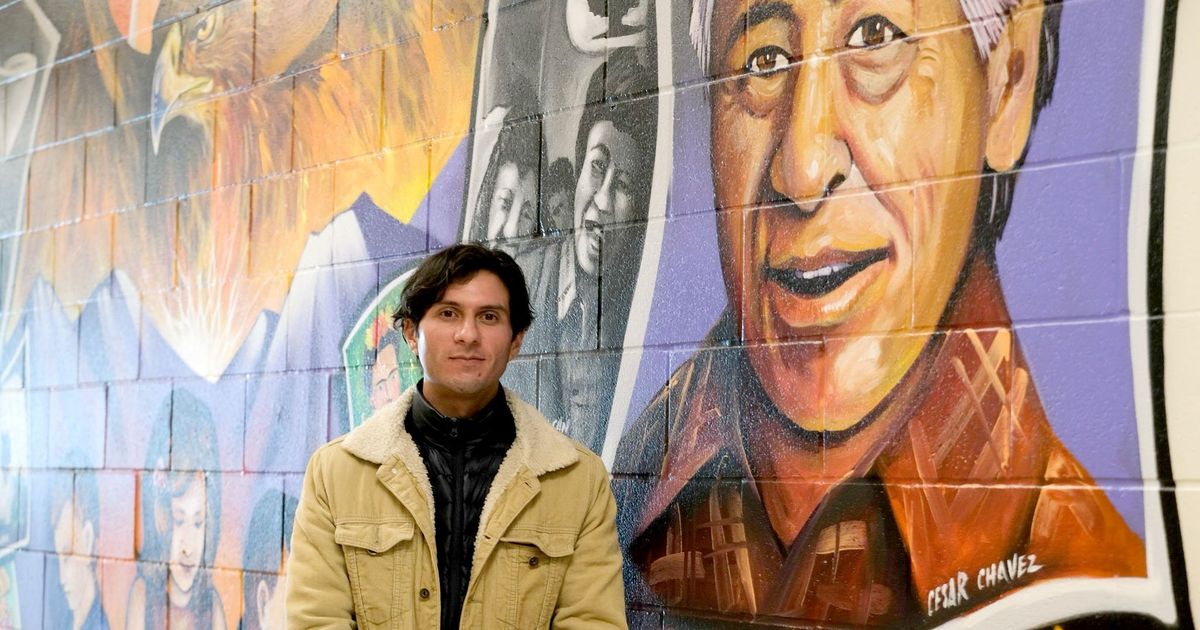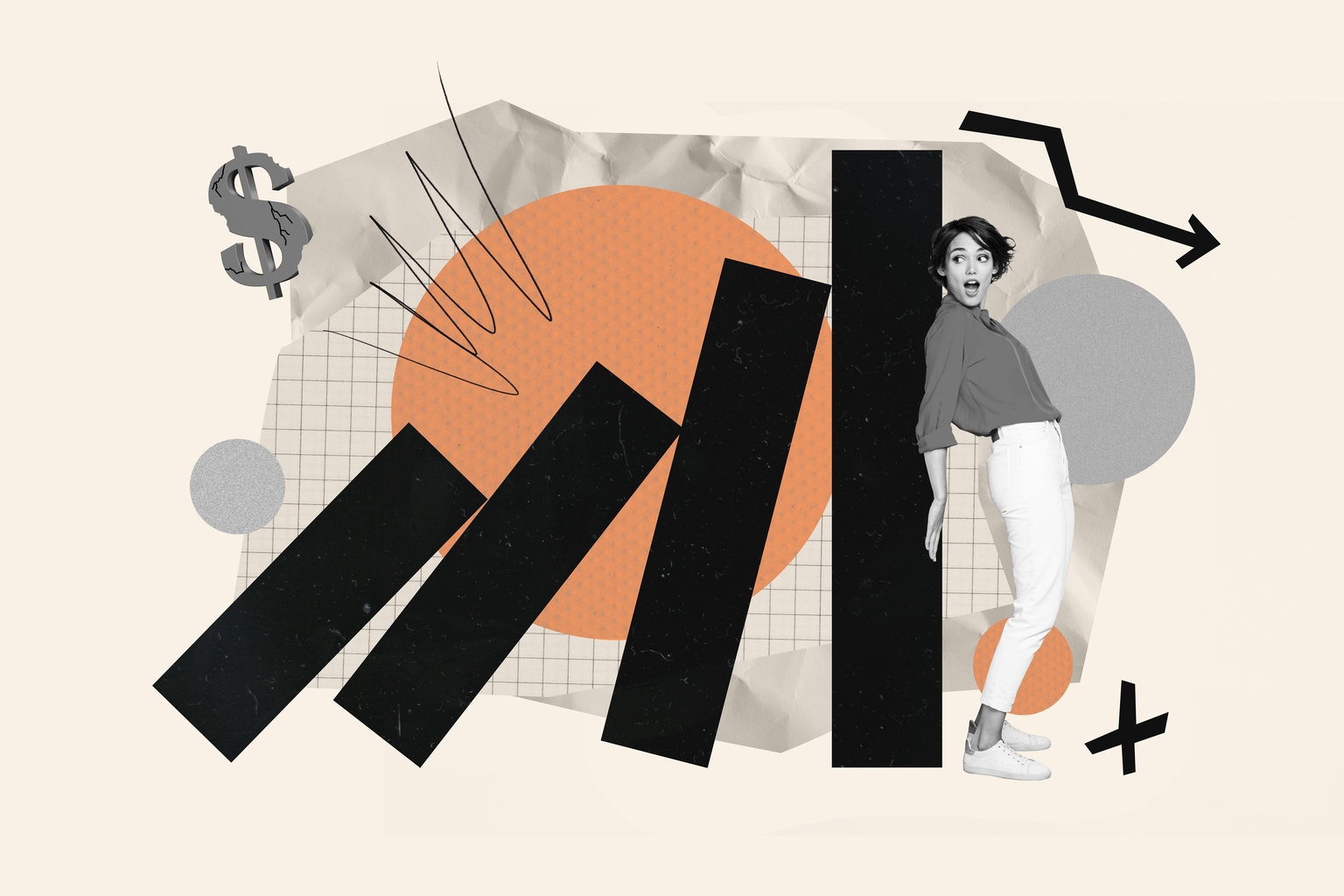Since 2018, Eduardo Chavez has been on film tours promoting his documentary, *Hailing Cesar*, which chronicles his journey to better understand the legacy of his grandfather, labor leader Cesar Chavez. He has visited numerous colleges and high schools, sharing this important story with students.
It wasn’t until 2023, however, when Eduardo visited an elementary school in a rural town in southern Idaho, that he truly realized the importance of sharing his story with younger generations.
“When I left that trip from Idaho after talking to these elementary school students, I said, ‘I want to make my next project to be centered around kids that age,’” Eduardo Chavez said.
Last month, Eduardo released his first children’s book, *Mi Abuelo César* (or, in English, *My Grandfather César*), inspired by his visit to Alturas Elementary in Hailey, Idaho. The book reflects his personal journey as a 7-year-old, listening to his father talk about his grandfather and learning about Cesar Chavez’s fight for farmworkers’ rights.
“I wrote this story to hopefully educate and inspire young people aged 5 to 9, to maybe be able to learn these themes for the first time and go on their own journeys with their parents — to learn about their history and why it’s important to be proud of where we come from,” Eduardo explained.
### The Legacy of Cesar Chavez
Cesar Chavez, who co-founded the United Farm Workers alongside Dolores Huerta, was a pivotal labor leader and civil rights activist known for his advocacy for farm workers. Huerta continues to be a labor leader and social justice advocate, tirelessly fighting for farm worker rights to this day.
Cesar Chavez’s influence reached Washington state as well. In April 1968, he led a two-day march of more than 2,000 people from Yakima to Granger to demand better conditions for farmworkers.
Eduardo Chavez visited the Yakima Valley in 2018, months after releasing his film and before beginning his tour, while on his way to Eastern Washington University to talk about his work. He also spoke at Central Washington University the following year.
“My grandfather passed away when I was only 2 years old, so I do my best to try and understand the magnitude of what he did, and I don’t think I’ll ever fully get it,” Eduardo said. “But as I’ve gotten older, I’ve definitely met so many people who lived through the ’60s and ’70s, and they really helped me contextualize why that was so important then and now.”
Visiting central Washington and meeting people who had worked with his grandfather helped Eduardo feel the magnitude and positive influence Cesar Chavez had on farm worker communities.
“They’ll always tell me there’s an incredible history here,” he noted.
### A Powerful Visit to Alturas Elementary
When Eduardo visited Alturas Elementary, he admits he was nervous, wondering if the kids would understand the ideas behind his film. During that visit, he spoke but did not show the film.
“I was five minutes into speaking to them when I realized I can just be myself, and I don’t need to tailor this message, because they’re young and they were so smart,” Eduardo recalled. “They were also very excited, because they were in the middle of a lesson learning about my grandfather.”
His visit left a strong impression on the Hailey community. Herbert Romero, a community organizer and cultural liaison in Hailey, connected with Eduardo Chavez in 2021 after wanting to bring Cesar Chavez Day events to the area.
Romero had initially contacted his friend, Los Angeles-based muralist John Zender Estrada, hoping to invite him to share his work with the community. John is known for many historical Cesar Chavez murals in Los Angeles.
“When I called him, I said, ‘I would like for you to come and talk about your work, why Cesar Chavez is so important, and why you do the murals, and I want you to do a mural here,’” Romero said. “And he says, ‘You know what Romero? I have something better. I’m in contact with Eduardo Chavez, his grandson.’”
Since then, Romero has worked with Eduardo Chavez to bring him back yearly to talk about his film and his growing understanding of his grandfather’s advocacy.
Romero was present during the Alturas Elementary visit, where students eagerly asked questions, and Eduardo answered them honestly and thoughtfully.
“It was so powerful. The answers that he gave were very down to earth, in a way that they could understand,” Romero said. “And some of the questions were very deep, about his experience, about him, his grandpa. It was incredible experiencing that in action and seeing him doing that.”
Brad Hansen, principal of Alturas Elementary, said although he wasn’t at the assembly, he recognized the importance of Eduardo’s visit in helping students learn where they come from.
“By coming, it brings those stories to life, right to our front door. We can tell kids the story is nonfiction and it really happened, but when it’s a person in the flesh, the illustrations now have life,” Hansen said. “Eduardo, his grandfather, and Dolores Huerta share the message that we all matter, and to be proud of who you are and to leave a lasting mark on your communities.”
### Leaving a Lasting Impact
After Eduardo’s talk, he remembers a few students came up to him, taking off their shoes so he could sign them.
Earlier this year, Eduardo returned to southern Idaho for a series of events, including a screening of his documentary at the Hailey theater.
“At the theater, some middle school kids were there with posters,” Eduardo said. “They wanted me to sign a poster, and I was talking to them. They said, ‘Oh, you probably don’t remember us, but you signed my shoes when you were here a few years ago.’”
He reflected, “It was some of the same kids, but now they were older and there to see the movie. It meant a lot to me.”
Currently, Eduardo Chavez is doing a book tour in California but hopes to return to southern Idaho soon and visit other schools across the Inland Northwest.
“Keeping our history alive is really quintessential for Latino people moving forward, because sometimes, as a young Latino growing up, you don’t see a lot of heroes,” he said.
“If we don’t keep this history alive, where people that look like us and have the same skin color as us are and were doing these incredible things, where can a young person draw inspiration from?”
—
*Eduardo Chavez’s work continues to inspire new generations to learn about their heritage and the powerful legacy of farm worker activism led by legends like Cesar Chavez and Dolores Huerta.*
http://www.spokesman.com/stories/2025/oct/20/grandson-of-labor-leader-cesar-chavez-publishes-ki/




